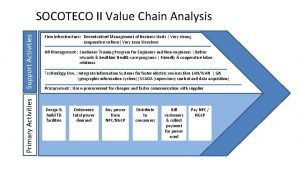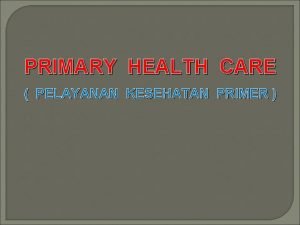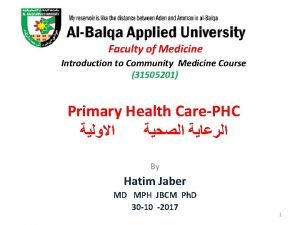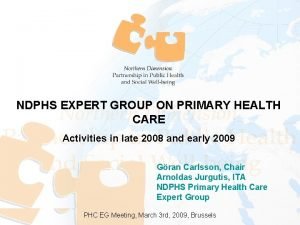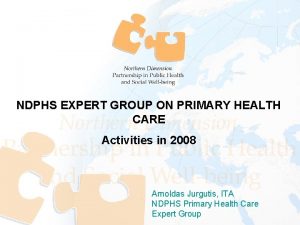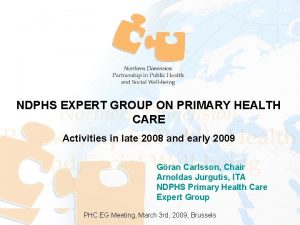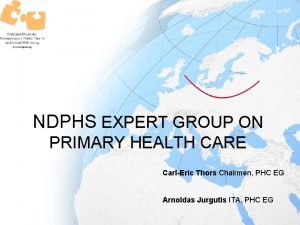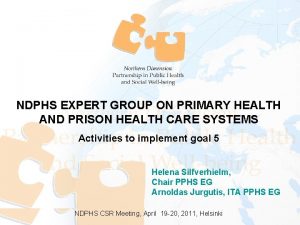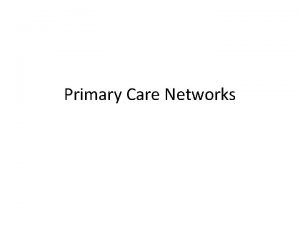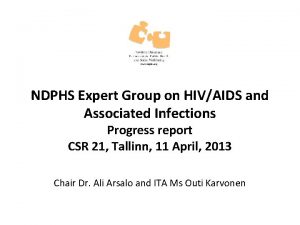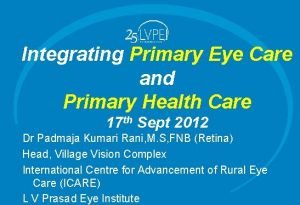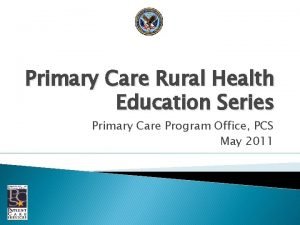NDPHS EXPERT GROUP ON PRIMARY HEALTH CARE Activities














- Slides: 14

NDPHS EXPERT GROUP ON PRIMARY HEALTH CARE Activities since April 2009 Göran Carlsson, Chair Arnoldas Jurgutis, ITA NDPHS Primary Health Care Expert Group NDPHS CSR Meeting, October 15 -16, 2009, Riga

To. R of PHC EG Overall objectives of ND PHC EG work: support efforts towards the improvement of health systems and health sector reforms enhance policies on political agendas that emphasize the role of primary health care in health systems promote networking and partnership building among relevant stakeholders

PHC EG Partner representatives Belarus (since October 2008) Estonia Finland Latvia Lithuania Norway Poland (co-lead partner) Russia Sweden (lead partner) WHO/Euro (participation in selected meetings)

Activities of PHC EG 2009 (1) Application for EU-funded PHC project ”Im. Prim” 201012 submitted to BSR Programme 2007 -2013 in March 2009 Im. Prim project approved September 2009 Input to SWG on strategic issues and on NDPHS MTGs submitted Chair participated in visit of SWG Chair and Head of Secretariat to WHO Euro and to NCM, Copenhagen

Activities of PHC EG 2009 (2) PHC EG meeting in Minsk September 10 -11 ● Satelite Workshop on PHC development in Belarus (Sept 10) Preparations for EG contributions to Prison Health side event at PAC in Oslo, November 2009 ● Main contribution by Finnish member Simmo Kokko

PHC EG 8 th Meeting in Minsk September 10 -11 Workshop with WHO Euro and Belarus Mo. H: PHC reform in Belarus - achievements and constraints Extensive discussions on NDPHS Goals and Targets in relation to Expert Groups tasks Discussions on the structure and specific objectives of the Position Paper – first of several position papers to include practical conclusions on PHC options for NDPHS Countries to address future health systems challenges Possibilities for project proposals and project funding in line with PHC EG objectives.

Im. Prim Project: “Improvement of public health by promotion of equitably distributed high quality primary health care systems” Objectives of Im. Prim project ● Promote the equitable distribution of high quality primary health care services in the BSR ● Increase cost-efficiency of the public health system and efficiently counteract communicable diseases as well as health problems related to social factors

Expected ”Im. Prim” project outcomes Policy instruments for increasing overall PHC resources identified Mechanisms for equitable distribution of PHC services developed Models to improve performance of PHC professionals in addressing health risks related to social factors and counteracting communicable diseases tested Strategies and tools for improving quality of PHC services recommended

Partners involved 14 partners from 8 countries (BY , EE, LV, LT, EE, PL, SE, FI) 5 Mo. H as associated partners (BY, LV, LT, SE, FI) Attemps to mitigate effects of non-signing of ENPI Financial Agreement by EU and Russian Federation • Two associated partners from Russia (Mo. H of Kaliningrad oblast and Central Research Institute of Health Organization and Informatization ) ● External funds for joint Im. Prim-Russia activities will be applied for

Current Im. Prim activities Contractual process with Joint Technical Secretariat – contract clarifications, linking up with ICT for Health Establishing Lead Partner management office Procurement of external services Grant contract for some 2. 2 m. Euro to be signed Activities to start within 3 mo of approval – Dec 16 Kick-off meeting Jan or Feb 2010

Other projects NDPHS Pipeline project ID 14: Establishing EBM and developing Quality of Care in PHC through extended networks of PHC doctors and nurses in Northwest Russia ● Main project donor is the Ministry of Health, Finland ● implemented by Blekinge Centre of Competence (Dr Ingvar Ovhed) with Murmansk, Archangelsk, St. Petersburg, Pskov and Kaliningrad. Initiated by PHC EG and applying (second time) for Norwegian Funds ● Improving utilisation of PHC services in Kaliningrad region through reduction of unjustified referrals to secondary health services ● Increase of the share of resources for PHC institutions in pilot region of Kaliningrad

Activities initiated by PHC EG to address ad hoc needs Seminar on Implementation of private independent contractors in Lithuania, for Kaliningrad Mo. H and regional health administrators, Klaipeda, April 30 th, ● following expressed needs during PHC EG Meeting in Kaliningrad; implemented by Swedish, Lithuanian members PHC EG Workshop on Tomorrow´s role of Family Doctors and Nurses, at Baltic Conference of Family Medicine, Piarnu, Estonia ● Initiated by Finnish and Norwegian experts Paula Vainiomaki and Toralf Hasvold ● Input for the PHC EG position paper collected

Essential issues related to CSR decisions on Goals and Targets Reality check for Partnership targets versus Expert Group set-up To. R and structure for Expert Groups Internal EG discussions on how to contribute to Partnership Goals – CSR governance vs EG autonomy

Future challenges for PHC in health systems ● ● ● ● ● Demographic changes Changing disease panorama Complex and co-morbid patients Team work within health care and social services Patient roles active, participatory New technologies – preventive, diagnostic, therapeutic and rehabilitative Information overflow – to adequately select rather than to produce more The knowledge base - from experienced based to evidence based Increasing gap between expectations and resources New teaching arenas
 Primary, secondary, tertiary care
Primary, secondary, tertiary care Support activities and primary activities
Support activities and primary activities Definition of primary activities
Definition of primary activities Indoor and outdoor sports examples
Indoor and outdoor sports examples Health and social care act 2008
Health and social care act 2008 Uccs health center
Uccs health center Australian primary health care research institute
Australian primary health care research institute Makalah pis-pk
Makalah pis-pk Principles of primary health care
Principles of primary health care Principles of primary health care
Principles of primary health care Defination of phc
Defination of phc Provision of essential drugs
Provision of essential drugs Principles of primary health care
Principles of primary health care Elements of primary health care
Elements of primary health care Qliance
Qliance

